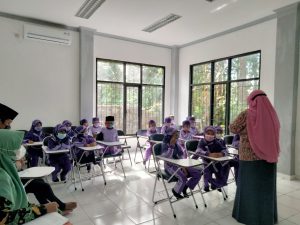Indonesia’s government is coming under pressure after a mass outbreak of food poisoning linked to President Prabowo Subianto’s controversial free meal program.
The latest outbreaks took place in West Java province last week, when more than 1,000 victims fell ill, complaining of nausea, dizziness, shortness of breath, and severe stomach pain. According to the Associated Press, “Television reports showed hospital wards filled with children, with some crying in pain and clutching their stomachs, while police officers and health workers carried away other victims in ambulances, vans, and trucks.” This came a week after a further 800 students were reported ill in West Java and Central Sulawesi.
The Free Nutritious Meal program (known by its Indonesian acronym MBG) began in January with the aim of fighting malnutrition by providing free meals to nearly 90 million children and pregnant women across the archipelago. But it has been dogged by concerns about quality of oversight after a spate of food poisoning outbreaks.
As of September 25, Indonesia’s National Nutrition Agency (BGN), which is administering the MBG program, had reported at least 70 separate poisoning incidents across three administrative regions, affecting 5,914 children. The Indonesian Education Monitoring Network, a local NGO, put the number of poisoning victims higher, at 6,452 as of September 21.
During a press conference in Jakarta on Friday, Nanik S. Deyang, the deputy head of the National Nutrition Agency (BGN), was forced to issue a rare public apology, saying that she was devastated by the outbreaks of poisoning.
“From the bottom of my heart, I sincerely apologize on behalf of BGN and all local nutrition service units across Indonesia,” Nanik said, as per the Jakarta Globe. “As a mother, seeing those videos of sick children breaks my heart.”
Nanik admitted the outbreak was caused by negligence within the agency, citing weak oversight of the kitchens producing the meals. She promised that BGN would take full responsibility, including covering all medical expenses. “This is not just about numbers; these are lives,” Nanik said. “We will ensure this never happens again.”
Earlier, BGN chief Dadan Hindayana said that kitchens with poisoning cases had been suspended and local governments had set up task forces of nutritionists and health workers to supervise the program.
The MBG program was among the main policy promises that Prabowo promised ahead of last year’s presidential election. The program has so far been extended to 22.7 million beneficiaries, with the government expecting it to cover 82.9 million people by the end of the year. The program is intended to tackle stunting, a condition caused by malnutrition that affects a fifth of children below the age of five in Indonesia.
Similar programs in other countries have been linked to positive health outcomes for children. However, Prabowo’s version of the scheme has been questioned for its considerable cost, which is expected to total $28 billion by the end of his five-year presidential term in 2029. The recent outbreaks of poisoning also affirm earlier concerns about program oversight and the possibility that corners are being cut in the drive to roll out the program across the full expanse of the Indonesian archipelago.
“This abnormal situation should require the government to declare an outbreak and temporarily halt the program for a thorough evaluation,” said Ubaid Matraji, the coordinator of the Indonesian Education Monitoring Network, the BBC reported.
Diah Saminarsih, chief executive of the Center for Indonesia’s Strategic Development Initiatives, a local think tank, said that the number of reported cases likely represented the “tip of the iceberg” and also called for the scheme to be suspended.
“The true number of cases is suspected to be significantly higher as many are reluctant to report what really happened,” Diah said. “We call to suspend the program due to health concerns.”
Given his pugnacious character and intolerance of criticism, Prabowo is unlikely to concede to these calls – and his officials say that there are no plans to cancel the program. A reporter for CNN Indonesia reportedly had his press pass revoked by the presidential palace after asking Prabowo an MBG-related question on Saturday, after he returned from his trip to the United Nations General Assembly in New York.
Back in May, the Indonesian leader said that the small number of food poisoning incidents paled in comparison with the size of the MBG program.
“Indeed, there was a poisoning today, around 200 people out of three million,” he said at the time. “Over five were hospitalized, so that means the success rate is 99.99 percent. A 99.99 percent success rate in any field is a good thing.”





























